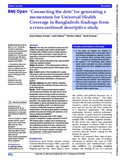| dc.contributor.author | Ahmed, Syed Masud | |
| dc.contributor.author | Rawal, Lal B | |
| dc.contributor.author | Naher, Nahitun | |
| dc.contributor.author | Hossain, Tarek | |
| dc.date.accessioned | 2022-04-03T04:42:02Z | |
| dc.date.available | 2022-04-03T04:42:02Z | |
| dc.date.copyright | 2019 | |
| dc.date.issued | 2019-07-17 | |
| dc.identifier.citation | Ahmed, S. M., Rawal, L. B., Naher, N., & Hossain, T. (2019). 'Connecting the dots' for generating a momentum for Universal Health Coverage in Bangladesh: Findings from a cross-sectional descriptive study. BMJ open, 9(7), e024509. https://doi.org/10.1136/bmjopen-2018-024509 | en_US |
| dc.identifier.uri | http://hdl.handle.net/10361/16502 | |
| dc.description | This article was published in BMJ Open [© Author(s) (or their employer(s)) 2019. Re-use permitted under CC BY-NC. No commercial re-use. See rights and permissions. Published by BMJ.] and the definite version is available at: http://dx.doi.org/10.1136/bmjopen-2018-024509 The Journal's website is at: https://bmjopen.bmj.com/content/9/7/e024509 | en_US |
| dc.description.abstract | Objective This study was conducted to explore how and
whether, the strategic grants made by the Rockefeller
Foundation (RF) in different sectors of health systems in
the inception phase were able to ‘connect the dots’ for
‘generating a momentum for Universal Health Coverage
(UHC)’ in the country.
Design Cross-sectional descriptive study, using document
review and qualitative methods.
Setting Bangladesh, 17 UHC-related projects funded by
the RF Transforming Health Systems (THS) initiative during
2010–2013.
Data Available reports of the completed and on-going
UHC projects, policy documents of the government relevant
to UHC, key-informant interviews and feedback from grant
recipients and relevant stakeholders in the policy and
practice.
Outcome measures Key policy initiatives undertaken
for implementing UHC activities by the government post
grants disbursement.
Results The RF THS grants simultaneously targeted
and connected the academia, the public and non-profit
development sectors and news media for awarenessbuilding and advocacy on UHC, develop relevant policies
and capacity for implementation including evidence
generation. This strategy helped relevant stakeholders to
come together to discuss and debate the core concepts,
scopes and modalities of UHC in an attempt to reach
a consensus. Additionally, experiences gained from
implementation of the pilot projects helped in identifying
possible entry points for initiating UHC activities in a low
resource setting like Bangladesh.
Conclusions During early years of UHC-related
activities in Bangladesh, strategic investments of the RF
THS initiative played a catalytic role in sensitising and
mobilising different constituencies for concerted activities
and undertaking necessary first steps. Learnings from
this strategy may be of help to countries under similar
conditions of ‘low resource, apparent commitment, but
poor governance,’ on their journey towards UHC. | en_US |
| dc.language.iso | en_US | en_US |
| dc.publisher | BMJ Journals | en_US |
| dc.relation.uri | https://bmjopen.bmj.com/content/9/7/e024509 | |
| dc.subject | Bangladesh | en_US |
| dc.subject | Rockefeller Foundation | en_US |
| dc.subject | Health systems strengthening | en_US |
| dc.subject | Transforming health systems | en_US |
| dc.subject | Universal health coverage | en_US |
| dc.title | ‘Connecting the dots’ for generating a momentum for Universal Health Coverage in Bangladesh: Findings from a cross-sectional descriptive study | en_US |
| dc.type | Journal Article | en_US |
| dc.description.version | Published | |
| dc.contributor.department | Brac James P. Grant School of Public Health | |
| dc.identifier.doi | http://dx.doi.org/10.1136/bmjopen-2018-024509 | |
| dc.relation.journal | BMJ Open | |

